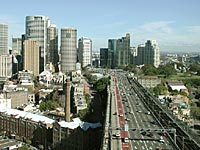Planning - 3360
This Program is no longer accepting new enrolments
Program Summary
Faculty: Built Environment
Contact: Built Environment
Campus: Sydney
Career: Undergraduate
Typical UOC Per Semester: 24
Min UOC Per Semester: 6
Max UOC Per Semester: 24
Min UOC For Award: 240
Domestic Entry Requirements: See Domestic Entry Requirements
International Entry Requirements: See International Entry Requirements
Award(s):
Bachelor of Planning
View program information for previous years
Program Description
Planning has as its focus the management and development of urban and rural areas; ranging from small local precincts to metropolitan areas and regions. The planner's task is often to integrate and coordinate the aims and actions of a large number of government and private organisations and individuals to provide an equitable and efficient distribution of resources. Working at the interface of development and the environment, this involves collecting and analysing information; identifying needs and options; making forecasts; preparing policies, plans and programs for implementation; exercising development control; investigating development proposals; and evaluating results, communicating outcomes and consultation.
Program Objectives and Graduate Attributes
The program is structured to allow students to study a secondary specialisation in a particular area or to sample a wide range of educational experiences from across the University.
Program Structure
Semester 1
- GEOS1701 Environ Systems. & Processes (6 UOC)
- PLAN1011 Urban Society (6 UOC)
- PLAN1101 Understanding Design (6 UOC)
- PLAN1241 Planning Theory and Practice (6 UOC)
- PLAN1042 Local Planning (6 UOC)
- PLAN1122 Development Processes (6 UOC)
- PLAN2801 GIS for Built Environment (6 UOC)
- Open Electives (6 UOC)
Semester 1
- PLAN2032 Urban Design (6 UOC)
- PLAN2041 Integrated Planning 1 (6 UOC)
- PLAN2152 Resources, Planning & Nat. Env (6 UOC)
- General Education (6 UOC)
- General Education (6 UOC)
Semester 1
- PLAN0081 Work Experience (24 UOC)
Semester 1
- PLAN0082 Work Experience (24 UOC)
- PLAN3015 Social Planning (6 UOC)
- PLAN3032 Integrated Plan 3 - Master (6 UOC)
- PLAN3052 Qualitative Methods (6 UOC)
- Interdisciplinary Learning Course* (6 UOC)
Semester 1
- PLAN4031 Research Design (6 UOC)
- PLAN4142 Professionalism, Ethics & Pol. (6 UOC)
- Interdisciplinary Learning Course* (6 UOC)
- Open Electives (6 UOC)
- PLAN4132 Thesis Project (18 UOC)
- Specified Planning Electives (6 UOC)
Additionally, students are not required to undertake the other elective and general educaton requirements in the exact order as indicated in the above program structure. This structure provides a suggested order for the completion of these elective and general education requirements, however a student can choose to do them in a different sequence. For example, a student may choose to complete an open elective in S2 of Yr 2 and undertake the 6 UOC of general education in Yr 5.
A list of 2015 Interdisciplinary Learning Courses is below:
Summer Semester:
- BEIL0017 Business Start Up (6 UOC)
- BEIL6000 Issues in Urbanism (6 UOC)
- BEIL6003 Cinematic Space (6 UOC)
- BEIL0001 Graphic Design for Built Env (6 UOC)
- BEIL0005 People, Place and Design (6 UOC)
- BEIL0007 Sustainable Design Thinking (6 UOC)
- BEIL0010 Creating Value for Built Env (6 UOC)
- BEIL0011 Healthy Planning (6 UOC)
- BEIL0013 Architectural Photography (6 UOC)
- BEIL0014 Digital Making (6 UOC)
- BEIL0016 Renewing the Urban Environment (6 UOC)
- BEIL6002 Urban and Regional Design (6 UOC)
- BEIL6004 Classical Architecture (6 UOC)
- BEIL6005 Art, Architecture and Design (6 UOC)
- BEIL0001 Graphic Design for Built Env (6 UOC)
- BEIL0003 BE Annual Design Competition (6 UOC)
- BEIL0005 People, Place and Design (6 UOC)
- BEIL0006 BE OutThere Elective (6 UOC)
- BEIL0008 Vision to Reality (6 UOC)
- BEIL0009 Exhibition Design (6 UOC)
- BEIL0013 Architectural Photography (6 UOC)
- BEIL0015 Digital Design Foundations (6 UOC)
- BEIL6001 International Planning (6 UOC)
- BEIL6006 Heritage Planning (6 UOC)
An indicative List of Specified Planning Electives is below:
- BEIL0011 Healthy Planning (6 UOC)
- BEIL6000 Issues in Urbanism (6 UOC)
- BEIL6001 International Planning (6 UOC)
- BEIL6002 Urban and Regional Design (6 UOC)
- BEIL6006 Heritage Planning (6 UOC)
- BENV2938 Transport Planning (6 UOC)
- BENV2942 Rural Planning (6 UOC)
PLANH13360
Honours
Academic Rules
2. To fulfil these requirements, students must complete:
- All specified core courses defined by an PLAN prefix and GEOS prefix in the progam structure (150 UOC)
- 48 units of work experience normally undertaken in 2nd semester of Year 3 and 1st session of Year 4 as prescribed in the Faculty regulations for this program.
- 12 UOC of FBE Electives from the list of Interdisciplinary Learning Courses (see list above)
- 6 UOC of specified Planning Elective
- 12 units of open (free) electives selected in accordance with the Faculty regulations for undergraduate study in the Faculty of the Built Environment.
- 12 units of General Education in accordance with University requirements (see below).
Progression
Courses are to be taken in the year sequence listed above, except with the permission of the Head of the Planning and Urban Development Program.
Fees
Professional Recognition
Area(s) of Specialisation









